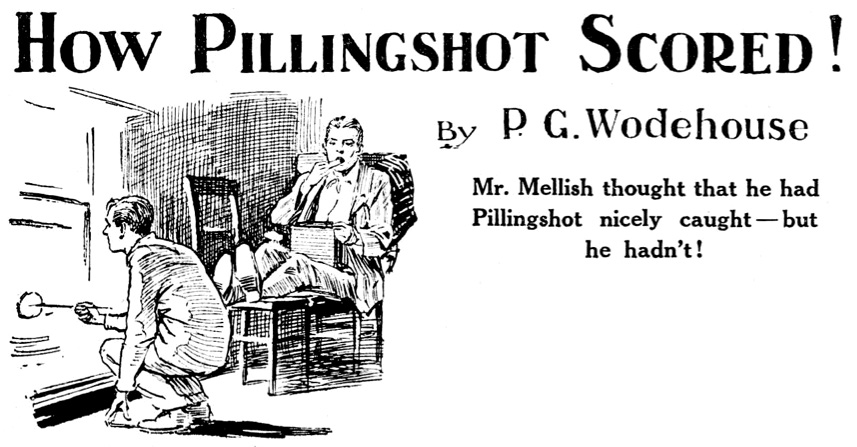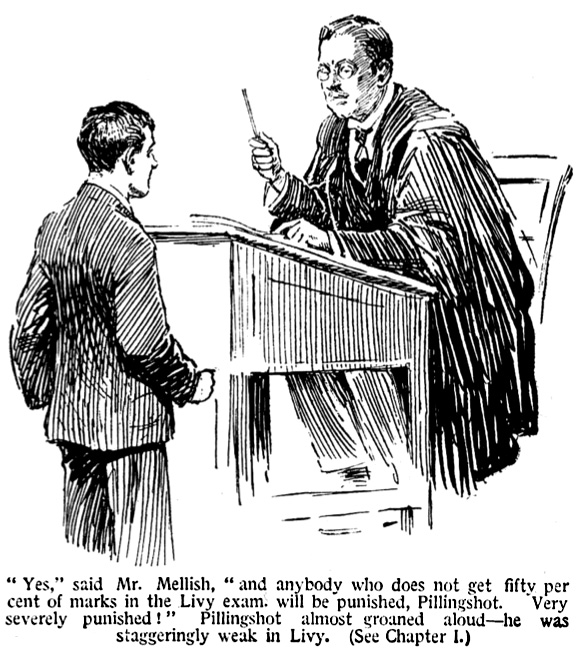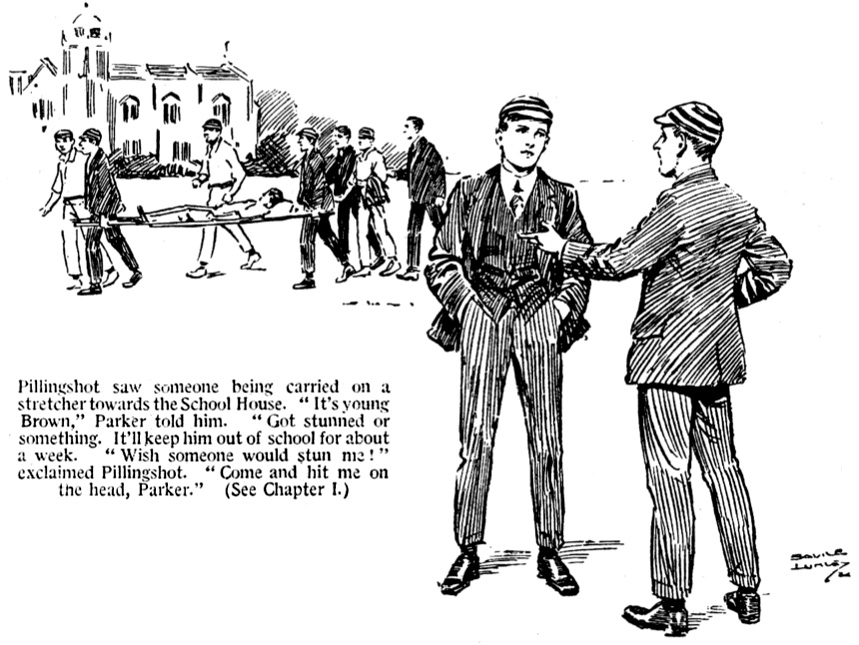Greyfriars Holiday Annual, 1926
Illustrations by Savile Lumley

THE FIRST CHAPTER
The Blow Falls!
Pillingshot was annoyed. He was disgusted, mortified; no other word for it. He had no objection, of course, to Mr. Mellish saying that his work during the term, and especially his Livy, had been disgraceful. A master has the right to say that sort of thing if he likes. It is one of the perquisites of the position. But when he went on to observe without a touch of shame that there would be an examination in the Livy as far as they had gone in it on the following Saturday, Pillingshot felt that he exceeded. It was not playing the game.
There were the examinations at the end of term. Those were fair enough. You knew exactly when they were coming, and could make your arrangements accordingly. But to spring an examination on you in the middle of the term out of a blue sky, as it were, was underhand and unsportsmanlike, and would not do at all. Pillingshot wished that he could put his foot down. He would have liked to have stalked up to Mr. Mellish’s desk, fixed him with a blazing eye, and remarked, “Sir, withdraw that remark. Cancel that statement instantly, or——!” or words to that effect.
What he did say was: “Oo, si-i-r!!”
“Yes,” said Mr. Mellish, not troubling to conceal his triumph at Pillingshot’s reception of the news, “there will be a Livy examination next Saturday. And”—(he almost intoned this last observation)—“anybody who does not get fifty per cent., Pillingshot, fifty per cent., will be severely punished. Very severely punished, Pillingshot.”

After which the lesson had proceeded.
“Yes, it is rather low, isn’t it?” said Pillingshot’s friend, Parker, as poor Pillingshot came to the end of a stirring dissertation on the rights of the citizen, with special reference to mid-term Livy examinations, “that’s the worst of Mellish. He always has you somehow.”
“But what am I to do?” raved Pillingshot.
“I should advise you to swot it up before Saturday,” said Parker.
“Oh, don’t be an ass,” said Pillingshot irritably.
What was the good of friends if they could only make idiotic suggestions like that?
He retired brooding to his house.
The day was Wednesday. There were only two more days, therefore, in which to prepare a quarter of a book of Livy. It couldn’t be done. The thing was not possible.
In the house he met Smythe.
“What are you going to do about it?” he inquired. Smythe was top of the form, and if he didn’t know how to grapple with a crisis of this sort, who could know?
“If you’ll kindly explain,” said Smythe, “what the dickens you are talking about, I might be able to tell you.”
Pillingshot explained, with unwonted politeness, that “it” meant the Livy examination.
“Oh,” said Smythe airily, “that! I’m just going to skim through it in case I’ve forgotten any of it. Then I shall read up the notes carefully. And then, if I have time, I shall have a look at the history of the period. I should advise you to do that, too.”
“Oh, don’t be a goat,” said Pillingshot.
And he retired, brooding as before.
That afternoon he spent industriously copying out the fourth book of the Æneid. At the beginning of the week he had had a slight disagreement with M. Gerard, the French master.
Pillingshot’s views on behaviour and deportment during French lessons did not coincide with those of M. Gerard. Pillingshot’s idea of a French lesson was something between a pantomime rally and a scrum at football. To him there was something wonderfully entertaining in the process of “barging” the end man off the edge of the form, and upsetting his books over him. M. Gerard, however, had a poor sense of humour. He had warned the humorist twice, and on the thing happening a third time suggested that he should go into extra lesson on the ensuing Wednesday.
So Pillingshot went, and copied out Virgil.
He emerged from the room of detention at a quarter past four. As he came out into the grounds he espied in the middle distance somebody being carried on a stretcher in the direction of the School House. At the same moment Parker loomed in sight, walking swiftly towards the school shop, his mobile features shining with the rapt expression of one who sees much ginger beer in the near future.
“Hullo, Parker,” said Pillingshot, “who’s the corpse?”

“What, haven’t you heard?” said Parker. “Oh no, of course, you were in extra. It’s young Brown. He’s stunned or something.”
“How did it happen?”
“That rotter, Babington, in Dacre’s. Simply slamming about, you know, getting his eye in before going in, and Brown walked slap into one of his drives. Got him on the side of the head.”
“Much hurt?”
“Oh, no, I don’t think so. Keep him out of school for about a week.”
“Lucky beast. Wish somebody would come and hit me on the head. Come and hit me on the head, Parker.”
“Come and have an ice,” said Parker.
“Right ho,” said Pillingshot. It was one of his peculiarities that whatever the hour or the state of the weather he was always equal to consuming an ice. This was probably due to genius. He had an infinite capacity for taking pains. Scarcely was he outside the promised ice when another misfortune came upon him. Scott, of the first eleven, entered the shop. Pillingshot liked Scott, but he was not blind to certain flaws in the latter’s character. For one thing, he was too energetic. For another, he could not keep his energy to himself. He was always making Pillingshot do things. And Pillingshot’s notion of the ideal life was complete dolce far niente.
“Ginger beer, please,” said Scott, with parched lips. He had been bowling at the nets, and the day was hot. “Hallo! Pillingshot, you young slacker, why aren’t you changed? Been bunking half-holiday games? You’d better reform, young man.”
“I’ve been in extra,” said Pillingshot with dignity.
“How many times does that make this term? You’re going for the record, aren’t you? Jolly sporting of you. Bit slow in there, wasn’t it? ’Nother ginger beer, please.”
“Just a bit,” said Pillingshot.
“I thought so. And now you’re dying for some excitement. Of course you are. Well, cut over to the house and change, and then come back and field at the nets. Yorke is going to bowl me some of his celebrated slow tosh, and I’m going to show him exactly how Hobbs does it when he’s in form.”
Scott was the biggest hitter in the school. Mr. Yorke was one of the masters. He bowled slow leg-breaks, mostly half-volleys and long hops. Pillingshot had a sort of instinctive idea that fielding out in the deep with Mr. Yorke bowling and Scott batting would not contribute largely to the gaiety of his afternoon. Fielding deep at the nets meant that you stood in the middle of the football field, where there was no telling what a ball would do if it came at you along the ground. If you were lucky, you escaped without injury. Generally, however, the ball bumped and deprived you of wind or teeth, according to the height to which it rose. He began politely, but firmly, to excuse himself.
“Don’t talk rot,” said Scott complainingly. “You must have some exercise, or you’ll go getting fat. Think what a blow it would be to your family, Pillingshot, if you lost your figure. Buck up! If you’re back here in a quarter of an hour, you shall have another ice. A large ice, Pillingshot, price sixpence. Think of it!”
The word “ice,” as has been remarked before, touched chords in Pillingshot’s nature to which he never turned a deaf ear. Within the prescribed quarter of an hour he was back again, changed.
THE SECOND CHAPTER
Pillingshot’s Brain-Wave
“Here’s the ice,” said Scott. “I’ve been keeping it warm for you. Shovel it down. I want to be starting for the nets. Quicker, man, quicker! Don’t roll it round your tongue. Go for it! Finished? That’s right. Come on!”
Pillingshot had not finished, but Scott so evidently believed he had that it would have been unkind to have mentioned the fact. He followed the smiter to the nets.
If Pillingshot had passed the earlier part of the afternoon in a sedentary fashion, he made up for it now. Scott was in fine form, and Pillingshot noticed with no small interest that, while he invariably hit Mr. Yorke’s deliveries a quarter of a mile or so, he never hit two balls in succession in the same direction. As soon as the panting fieldsman had sprinted to one side of the football ground and returned the ball, there was a beautiful musical plonk and the ball soared to the very opposite quarter of the field. It was a fine exhibition of hitting, but Pillingshot felt that he would have enjoyed it more if he could have watched it from a deck-chair.
“You’re coming on as a deep field, young Pillingshot,” said Scott, as he took off his pads. “You’ve got a knack of stopping them with your stomach, which the best first-class fields never have. You ought to give lessons at it. Now we’ll go and have some tea.”
If Pillingshot had had a more intimate acquaintance with the classics, he would have observed at this point, “Timeo Danaos,” and made a last dash for liberty in the direction of the shop. But he was deceived by the specious nature of Scott’s remark. Visions rose before his eyes of sitting back in one of Scott’s armchairs, watching a fag toasting muffins, which he would eventually despatch with languid enjoyment. So he followed Scott to his study. The classical parallel to his situation is the well-known case of the oysters. They, too, were eager for the treat.
They had reached the study, and Pillingshot was about to fling himself with a sigh of relief into the most comfortable chair, when Scott unmasked his batteries.
“Oh, by the way,” he said, with a coolness which, to Pillingshot, appeared simply brazen, “I’m afraid my fag won’t be here to-day. The young crock’s gone and got mumps or the plague, or something. So would you mind just lighting that stove? It’ll be rather warm, but that won’t matter. There are some muffins in the cupboard. You might weigh in with them. You’ll find the toasting-fork on the wall somewhere. It’s hanging up. Got it? Good man. Fire away!”
And Scott collected five cushions, two chairs, and a tin of mixed biscuits, and made himself comfortable. Pillingshot, with feelings too deep for words, did as he was requested. There was something remarkable about the way Scott could always get people to do things for him. He seemed to take everything for granted. If he had had occasion to hire an assassin to make away with the Sultan of Turkey, he would have said:
“Oh, I say, you might run over to Constantinople and kill the Sultan, will you, there’s a good chap? Don’t be long.”
And he would then have taken a seat and waited, without the least doubt in his mind that the thing would be carried through as desired.
Pillingshot had just finished toasting the muffins, when the door opened, and Venables, of Merevale’s, came in.
“I thought I heard you say something about tea this afternoon, Scott,” said Venables. “I just looked in on the chance. Good man! Fancy muffins at this time of year! Do you happen to know what the thermometer is in the shade?”
“Take a seat,” said Scott. “I attribute my entire success in life to the fact that I never find it too hot to eat muffins. Do you know Pillingshot? One of the hottest fieldsmen in the school. At least, he was just now. He’s probably cooled off since then. Venables—Pillingshot, and vice-versa. Buck up with the tea, Pillingshot! What, ready? Good man! Now we might almost begin.”
“Beastly thing, that accident of young Brown’s, wasn’t it?” said Scott. “Chaps oughtn’t to go slamming about like that with the field full of fellows. I suppose he won’t be right by next Saturday?”
“Not a chance. Why? Oh, yes, I forgot! He was to have scored for the team at Windybury, wasn’t he?”
“Who are you going to get now?”
Venables was captain of the St. Austin’s team. The match next Saturday was at Windybury, on the latter’s ground.
“I haven’t settled,” said Venables. “But it’s easy to get somebody. Scoring isn’t one of those things which only one chap in a hundred understands.”
Then Pillingshot had an idea—a great, luminous idea.
“May I score?” he asked, and waited trembling with apprehension lest the request should be refused.
“All right,” said Venables. “I don’t see any reason why you shouldn’t. We have to catch the eight-fourteen at the station. Don’t you go missing it, or anything.”
“Rather not,” said Pillingshot. “Not much!”
* * *
On Saturday morning, at exactly 9.15, Mr. Mellish distributed the Livy papers. When he arrived at Pillingshot’s seat and found it empty, an expression passed over his face like unto that of the baffled villain in melodrama.
“Where is Pillingshot?” he demanded tragically. “Where is he?”
“He’s gone with the team to Windybury, sir,” said Parker, struggling to conceal a large size in grins. “He’s going to score.”
“No,” said Mr. Mellish sadly to himself; “he has scored.”
the end
Printer’s errors corrected above:
Magazine had “I want it be” in first paragraph of chapter 2; corrected to “I want to be” as in the original appearance in The Captain, May 1903.
 Madame Eulalie’s Rare Plums
Madame Eulalie’s Rare Plums